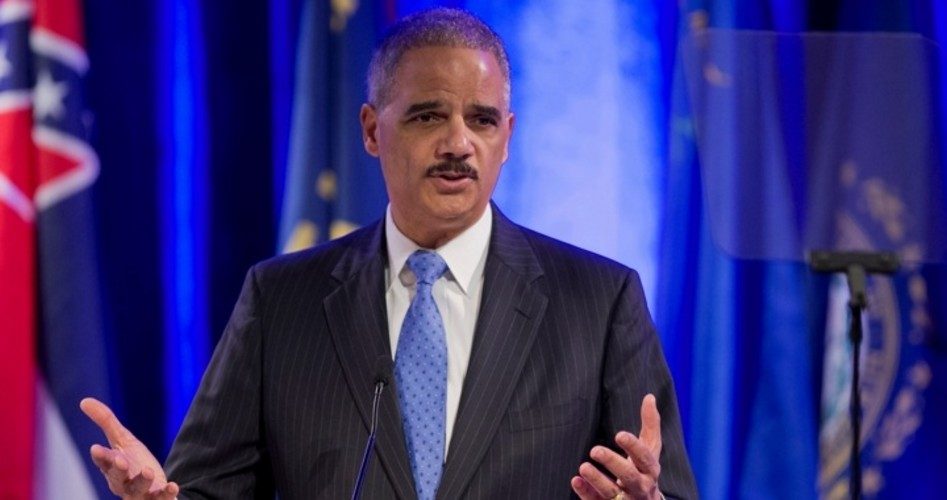
Attorney General Eric Holder (shown) added more fuel to the debate over the Obama administration’s attitude toward upholding the law Monday when he said in an interview that state attorneys general are not obliged to defend laws they believe are discriminatory.
Six state attorneys general, all Democrats, have refused to defend bans on gay marriage. That has prompted criticisms from Republicans who say the AGs have a duty to stand behind their state laws, whether or not they agree with them.
The controversy parallels what occurred at the federal level when the President Obama instructed the U.S. Department of Justice not to defend the Defense of Marriage Act (DOMA) that had been passed by Congress and signed by President Clinton in 1996. Some Republicans have argued that that action, plus not only his unilateral suspension of provisions of immigration law, but his signature legislative achievement, the ObamaCare health insurance law, constitute impeachable offenses by the president.
The Defense of Marriage Act, which said the federal government would recognize only heterosexual marriages, was struck down by the U.S. Supreme Court last year in United States v. Windsor, a suit brought by a New York woman prevented by DOMA from claiming a surviving spouse exemption on the tax on her inheritance from her deceased female partner, whom she had married in Canada. New York had legalized same-sex marriage by the time the case reached the Supreme Court.
The court also ruled that a citizens’ group from California, attempting to overturn a federal judge’s ruling against that state’s constitutional ban on same-sex marriage, lacked the legal standing needed to defend the law after the state’s attorney general refused to do so.
Holder said Monday the decision should not be made on personal political or policy preferences, but that laws impinging on the constitutional guarantee of equal protection of the laws should be examined closely by attorneys general in determining whether they should defend them in court. “Engaging in that process and making that determination is something that’s appropriate for an attorney general to do,” Holder said.
Holder’s comments came at a time when the states’ top law-enforcement officials are in Washington for a three-day conference of the National Association of Attorneys General. Holder is scheduled to address the group on Tuesday.
“It really isn’t his job to give us advice on defending our constitutions any more than it’s our role to give him advice on how to do his job,” Attorney General J. B. Van Hollen of Wisconsin, a Republican, told the New York Times. Wisconsin is one of several states that have adopted amendments to state constitutions to limit marriage to a union between a man and a woman. It is one of 33 states whose marriage laws do not provide for same-sex couples and one of 25 currently being sued on behalf of same-sex couples seeking to wed. In Wisconsin, four couples are challenging the state’s marriage amendment.
“If there’s one clear-cut job I have, it’s to defend my Constitution,” Van Hollen said. “There is no one else in position to defend the state Constitution if it comes under attack.” In a Washington Post article earlier this month, Republican John W. Suthers said his job as Colorado’s attorney general is to defend all of that state’s laws, regardless of content or subject matter. “I personally oppose a number of Colorado’s laws as a matter of public policy, and a few are contrary to my religious beliefs,” Suthers wrote. “But as my state’s attorney general, I have defended them all — and will continue to.”
Nevada, Oregon, Pennsylvania, and Virginia are among the states whose attorneys general have refused to defend laws against suits on behalf of same-sex couples. In Illinois, as in California, the attorney general refused to defend a marriage law that was overturned in court for its exclusion of same-sex couples.
“The answers to these questions are crystal clear,” said Gary Buseck, legal director of Gay and Lesbian Advocates and Defenders. “Attorneys general can’t close their eyes to something that’s blatantly unconstitutional. They’re not supposed to defend the laws at all costs.”
But the blatancy is apparently in the eye of the beholder. The federal Constitution says nothing about marriage, one of the numerous and indefinite subjects of legislation not delegated to the federal government, but which is, in the words of the 10th Amendment, “reserved to the States respectively, or to the people.”
The issue raises once again the debate over whether articles of the Constitution should be interpreted according to the general understanding of them at the time they were ratified, or as abstract principles to be adapted by judges according to changing times and circumstances. The 14th Amendment, for example, requires each state to provide to all persons within its jurisdiction “equal protection of the laws.” It was passed in 1868, a mere three years after the end of the Civil War and the emancipation of slaves. Its obvious intent was to ensure that no person in any state would be denied the protection of law because of race or color. Few, if any, would argue that the Congress that passed the amendment or the people in the states who ratified it intended to open state marriage laws to same-sex couples.
Rather, what same-sex marriage advocates appear to be saying when they invoke the 14th Amendment is that the people who ratified that amendment in 1868 established a right to same-sex marriage without knowing it. But it hardly speaks well of our republican form of government to suggest that in America the people amend the Constitution without knowing what they are doing. In fact, the people do no such thing.
We have judges for that.
Photo of Eric Holder: AP Images



